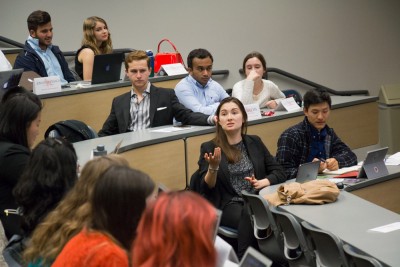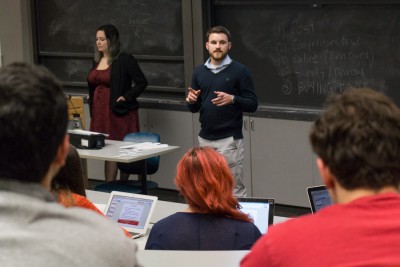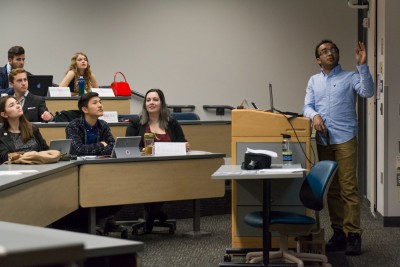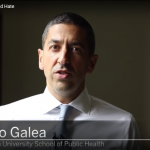
Boston University Student Government met for its Senate meeting Tuesday and went over the timeline of the upcoming Executive Board election and discussed the progress of the Constitution Reform Committee.
The Student Elections Commission President Grace Cusick, a sophomore in the College of General Studies, presented a timeline of scheduled activities throughout the upcoming election period. According to the presentation, the student body will be able vote on its choice of slate from March 28 to April 3.
During the meeting, concerns arose over how elections would run simultaneously with the Constitutional Reform Committee writing a new Constitution. However, SG President Andrew Cho said during the meeting that the E-board structure would stay in place with the new Constitution.
Cho, a senior in the College of Arts and Sciences, said he is excited to see how the election will turn out with changes to the Constitution happening at the same time.
“[How students feel about the changes] will shape how SG functions, and hopefully it won’t be so drastically different,” Cho said. “It will definitely cause a lot of different interests with the elections. [Elections] are not just going to be like, ‘We are bringing change to campus.’ It’s going to be about, ‘How do you want student government to run?’”
Senate Chair Courtney Bold announced during the meeting that SG plans to have a two-hour cultural sensitivity training next week in place of the regular Senate meeting. Staff from the Howard Thurman Center for Common Ground will lead the meeting.

“The goal of the sensitivity training is to have senators be able to understand their constituencies and their individual constituents better,” Bold, a senior in the Questrom School of Business, said after the meeting. “Each constituency is made up of so many different people, and I want to be able to give senators the tools they need … to understand their points of views and to take opinions into account when senators vote on behalf of them.”
During the meeting, Justin Flynn was confirmed as a judicial commissioner with 29 votes in support and one against. Flynn, a judicial commissioner since the spring 2015 semester, said he enjoyed being a judicial commissioner despite the problems that occurred in SG last semester.
“[Problems with the old Constitution] just come with the democratic process, and I’m up for the challenge,” Flynn, a junior in Questrom, said after the meeting. “It’s just part of the job. [Senators] thought I could be up to do it again, so I said, ‘Why not?’”
SG Vice President of Internal Affairs Yasmin Gentry also presented Content Arm, a blog-like medium for SG to better communicate with the student body. Gentry, a senior in the College of Communication, said Content Arm would allow students to post opinion and editorial pieces and access SG announcements as well as projects.

Several senators commented on the upcoming elections and talked of what the Constitutional Reform Committee meetings have been like.
Nehemiah Dureus, a College of Engineering senator and a freshman in ENG, said he is excited for the election season and to reach out to his constituents.
“[Rewriting the Constitution] certainly makes things more complicated, but it’s for a good cause,” Dureus, a member of Constitutional Reform Committee, said. “Honestly, we will be able to hack out everything and have really good elections.”
Daniel Collins, Senate vice chair and a CAS senator, said the Constitutional Reform Committee, which had their fourth meeting after the Senate meeting, has been successful despite some setbacks.
“I’ve been very impressed with everyone [in the committee],” Collins, a sophomore in CAS, said. “There have been multiple big written proposals. Senators and non-senators have been writing long proposals that are detailed and smart, and people are working to find compromises on all of them.”














